- Home
- Chuck Wendig
Thunderbird Page 2
Thunderbird Read online
Page 2
THE WIDENING GYRE
Behold the black vulture.
A big bird, the black vulture: the one in which Miriam finds herself is bigger than most, with a wingspan of five feet—like a reaper cloak cast wide— and weight coming up just shy of ten pounds. Others like it wheel about the sky, and Miriam finds her mind in those, too. Fragmented like a punched mirror— pieces of her scattered. Turning, turning.
It is believed to be a carrion bird, the black vulture. And that is true, to a point: humans are poor janitors of the world they inherited. A car strikes a deer: nobody comes along to clean its smashed skull and spackled guts off the road. Or an armadillo or a marmot. Or even just garbage tossed out a window— garbage that maybe stays where it landed, or maybe gets picked up and put in a bigger pile: a garbage dump miles away. Vultures are glad to be the janitors that humans will not be. Eating what is left. Gorging. They will even do this for human remains: the Old World vultures eat the corpses left in the sky burials of Tibet, or on the Towers of Silence in Zoroastrian practice, thus releasing the soul from the body. (The vultures care little about souls and care very much about eating.)
In fact, the black vulture’s head is featherless for just such eating. Its wrinkled, scrotum-like scalp can plunge all the more easily into a carcass with nothing to halt its entry or its exit— the bird sticks its entire head inside the animal, beak and eyes and everything, feasting on all the best bits hidden from view.
But it is a mistake to think of the black vulture as only a carrion bird.
The vulture is a bird of prey.
Cattlemen know it. They know that when a calf is pushed from its mother’s body, all knobby-kneed and snot-slick, a wake of vultures (for vultures are very social birds) will descend on the newborn calf.
They will kill it. They will peck out its eyes. They will rip off its nose or tear out its tongue. They will stab at it with their hooked beaks, tearing it, ripping it, until it goes into shock and they may feast with comfort.
They can do this with many small or newborn creatures.
Vultures will eat the dead. But they also like to kill.
Unlike turkey buzzards, the black vulture relies on sight to spot prey, and were this a wooded area, they might not be able to spot the man in desert fatigues below— but they do, because they have good eyes. He moves. The sun flashes in the flat of the scope, the bolt of the rifle.
Distantly, Miriam thinks: ten seconds.
It’s like a rope, invisible around the vulture’s neck. Yanking it downward. And when this one dives, so do the rest of them. Wings back in a sharp V— long neck and featherless head craned forward, talons thrust down.
Wind whipping.
One vulture, then three, then seven.
Seven birds and nine seconds.
Tick-tock.
The man— broad-shouldered, pot-bellied, a scruff of beard on his face so patchy it might as well be half another man’s beard glued to his cheeks, aviator sunglasses capturing light— he must hear the ripple of feathers.
He looks up. Mouth open in shock. The rifle clatters to the flat rock on which he lies, and he staggers backward, reaching for a pistol at his hip—
Another distant thought from Miriam, a grim reminder that once again, this thing she does has rules and one of the rules is that fate is elastic— it likes to snap back to its shape even when it bends and stretches, and just because the man dropped his gun that does not mean he will not again pick it up and again complete the circuit that fate has made. He can still kill Miriam. He can still kill Gracie.
Maybe even the boy.
And so, he must die.
He takes a step backward, raises the pistol—
The vulture has a peculiar defense mechanism. Miriam did not know this but now she does (she suddenly knows way more about vultures than she ever anticipated, thanks to inhabiting one): the vulture has a septic mouth, a toxic gullet, a belly full of half-digested mess that was already rotten before it entered the vulture’s body and has only stewed in the decomposition inside the cistern of the bird’s horror-show stomach—
And it can regurgitate those contents at will.
Translation: the black vulture uses its vomit as a weapon.
Here, seven vultures do just that thing. Beaks open. Throats bulging. Hot, disgorged vulture barf— a scalding, acidic, sour gut slurry— launches forth, striking the man in the face. The pistol barks a shot. The bullet goes wide.
The first vulture, the leader of the wake, hits him like a train to the chest. Talons ripping into the buttons of his fatigues. He topples backward. His head strikes a rock. Skull breaking. A hooked beak plunges into the soft meat of his nose. More birds land upon him. Talons tearing fabric. Beaks poking in through the rent clothing, seeking skin.
His body begins to shake as it is disassembled. His foot kicks out, knocks his rifle off the rock. The pistol in his hand slides away with a clatter. Trauma rocks through his body. Death descending upon him in a rippling flurry of rot-stink wings.
SIX
BACK IN BLACK
Eyes shut. Her jaw works. Her tongue flattens against the roof of her mouth and she can taste the septic puke taste, and she can taste the hot coppery jets of blood and the fatty strips of human meat and then her eyes are popping open like the doors of a cuckoo clock before she rolls over onto her hands and knees.
She, of course, pukes.
What comes out of her is mostly just water. And the remnants of a granola bar. But she half-expects to see a human finger or a pair of aviator sunglasses clatter against the road.
Miriam feels for the water bottle. Not much left, but it’s something. She takes a gulp, swirls it around. Cheek bulge, swish swish spit.
Looking up, she sees the Subaru sitting there. And her truck: gone. No— not gone, but certainly going. There it is, way in the distance now. Half-mile off and heading the other direction. The engine rattling as it always does.
Or did, because she doesn’t have it anymore.
“Goddamn fucking fuck,” she hisses. She takes the last mouthful of water, and this, she drinks. Stands and groans. Of course the woman took the keys (and her phone, by the looks of it, broken as it is) and stole her truck. At least the loon didn’t shoot me in the face before she stole my pickup.
Of course, the sun might do her in before long anyway.
She heads over to the Subaru. Door’s unlocked. She finds a mostly empty bottled water in the cup holder. It’s warm and meager, but it’s something.
Inside of the car isn’t much to look at. Dirty, dusty, the dashboard cracked. She feels around for the keys. Nothing.
Think, Miriam. Think.
She should be worrying about survival— about where to go next— but all she can think about is the taste in her mouth. And the man out there in the desert, a sniper, who tried to kill . . .
Well, who the hell was he trying to kill?
The woman, right? Not Miriam. But here a little splinter of doubt works its way under her mental fingernail: What if he was trying to kill me, not her?
Who wanted the woman? And her son?
What the fuck is going on here?
She snaps her fingers. Okay. Two choices here— one, walk. She knows there’s a rinky-dink gas station, what, about two miles thataway. But, she also knows that out there in the wide-open rocky nowhere, a man lies dead. A man who was going to kill her with a rifle. That man might have a phone.
That’s the plan, then.
Miriam heads into the desert.
INTERLUDE
THE LIVING GRAVEYARD
Her mother looks soft and weak. Like she’s melting away, her definitions slowly lost. Persistent vegetative state, they’re saying. Which is why Evelyn Black is here. In this place with the other living dead. Zombies lined up, two or three to a room. Here it’s not humans that talk to one another, but what sounds like machine banter: beeping, hissing, clicking. Like robot caretakers talking about their day tending the barely living.
/>
When Miriam last saw her mother, the woman was still . . . somewhat there. Mostly gone, but she’d make these appearances, like her mind was rocketing toward the surface, a dolphin breaking free of the sea’s constraints, and once in the open air she’d laugh and gabble and babble and then: sploosh, back down to the deep dark nowhere. Conscious, but only just that.
Now that’s gone. Evelyn has retreated entirely. Must’ve gotten tired breaching the surface of her own awareness so many times. Somewhere, while Miriam was gone, the woman sank. Glub, glub, glub. A flurry of bubbles.
The river is rising.
That. An old thought. A mean memory like a bully who caught her behind the playground, fists out and ready to throw a quick punch.
Miriam shudders.
“I went to Colorado,” she tells Evelyn. “I found . . . well, I found a way forward. Took me a while, but . . .” She puffs out her cheeks, exhales. Suddenly frustrated, she says: “Can you even hear me? Are you even in there? Do you even give a shit that I’m here? Can you even give a shit?”
Beep. Hiss. Click.
Her mother like a wax doll that’s only a little bit melted.
“I’m going back out on the road,” Miriam says. “Arizona this time. Everything’s sorted with you here, so . . .” Evelyn had money stored up. Enough to cover this. And, Miriam thinks, enough to give her a little traveling money, too. The lawyers made everything easy. It’s not like her mother’s in the ground, not yet. Miriam gets to play custodian of the dead, the accountant to a ghost. Nobody contested shit. The only trick is going to be what to do with Uncle Jack. For now, she has money. Some she can take with her. But as soon as she runs out, she’s going to have to pay him a visit. And she’s going to have to sell her mother’s house right out from under him. Poor scuzzball.
Miriam sighs. Starts to stand.
Her mother’s hand darts out, catches Miriam’s wrist. Vise grip.
The room darkens. The window— once framed by the light of the pale late-winter sun— is swallowed by spreading shadow.
Her mother’s head lurches up— the neck long, too long, bones crunching, spine crackling like a whole sheet of bubble wrap given a vicious twist.
“You weak-kneed cunt,” her mother says, the woman’s voice a gravelly, shattered thing. “Leaving me. Always leaving. Running away. Little quitting bitch. You can’t just turn it off, Miriam dear. You are who you are. It is what it is.” Her mother’s hand closes tighter on Miriam’s wrist— Miriam tries to pull away, but it’s like her wrist is pinned under a boulder. Then Evelyn’s mouth cranes open, the jaw popping like a broom handle splitting, and a scorpion the yellow of infected mucus skitters out onto the balcony of her gray tongue, and her voice rises again, louder this time and drier, like she’s gargling a throatful of dust: “A storm is coming, daughter of mine, and you can’t outrun it—”
“Everything all right in here?”
A nurse’s voice. Big guy, ginger hair, even more gingery beard. Miriam looks down: her mother is again on the bed. Supine. Staring up at nothing. Mouth a flat line, open just so, as if experiencing a moment of tiny surprise.
“Yeah,” Miriam says, her voice dry. “Fine. Everything’s fine.”
SEVEN
CARRION BAG
It’s barely a body anymore. It sits there on the rock, just a few feet off the ground: a lobster-red sack, wet and exposed, stuffed into the tatters of gore-soaked fatigues. The vultures still gather upon the body like a clutch of deliberating judges, and Miriam thinks to shoo them, but she doesn’t have to.
They don’t take flight. They merely hop and flutter aside, turning around like sentinels, gathering in a ring and watching her. Making room for me, she thinks. Room for one of their own.
Black eyes staring. Beaks clacking. One of them still has a string of meat hanging in its mouth— it cranes its head back and snap snap snap eats it right up like a late-night stoner gobbling up the last crumbs in the Doritos bag.
Even in the heat she can’t repress the shudder that runs through her.
She looks back over her shoulder. The Subaru sits some three hundred yards back. Her head throbs. Everything feels woozy, boozy.
At her feet: a rifle. She doesn’t know shit about guns, but it’s more a hunting rifle than anything military-looking. Wood stock, scope. She bends down, takes a gander and sees the words REMINGTON 700 etched in the barrel.
Not far from that, the pistol. Black, boxy, small. The rifle is too much, but the pistol? “Hey, free gun,” she tells the vultures, who stand and stare as she scoops up the gun and tucks it in her back pocket. “You guys want it?”
They don’t.
Now: the corpse.
The heat from the rock rises, carries his smell with it. It’s not a rotten odor— this is fresh death, a hot Krispy Kreme donut stuffed with blood and voided bowels. Coppery, greasy in the nose, so thick she can almost taste it. Then the real stink hits her—the rancid rancor of vulture vomit just about kills her.
Her gorge rises. She bites it back. Breathes through her mouth.
Miriam steps over to the carcass. Then thinks better and goes and gets the rifle— the rifle that becomes her tool. She pokes and prods with the barrel. (Careful, of course, not to go blowing the body apart unnecessarily. Not that the guy could get any deader, but she doesn’t feel like covering herself in his spray.) First she uses it to tap the side of his pants pocket— it thuds against something hard. Maybe a wallet, maybe something else.
She holds her nose, leans back while reaching forward. Turns out it’s both: she pries from his wet pocket a wallet and a cell phone. Wallet is beat-up brown leather. Phone is a basic jobby: just a candy bar brick. Kind you might get free with a phone plan— not far from her own burner, which Crazy Gracie stole.
Miriam scoots back, then pops the wallet.
Arizona license. Steven McArdle. Got forty bucks in there and a MasterCard, both of which she pilfers. “Don’t mind if I do, you murdering dickwhistle.” A sudden nostalgic glow washes over her, like remembering Christmas from your childhood or calling upon some memory from college, except here it’s robbing a dead body of its wares that feels like old times. Her finding folks who were going to die, then conveniently maneuvering herself to be present at their ineluctable ends to snatch the cash and cards from their wallets. The golden haze of nostalgia suddenly feels like a radioactive glow cloud. Still, money’s money.
The phone, she turns on. And it’s got a security PIN.
Gah! She’s about to use both feet to kick the body off the flat rock— but then she sees something sticking out of his back pocket, too. Like a handkerchief. Yellow as a goldfinch. She reaches forward, thumb and forefinger like a pair of pincers working an autopsy.
It’s like a handkerchief, but it’s not. Rectangular. Like a small flag.
Actually, by the looks of it, it really is a small flag. A crudely stitched image decorates the fabric: a dead tree like a skeleton’s hand, its branches decorated with simple five-point stars. And coming from above: forked lightning that has not yet struck the tree.
Below the tree, three words:
THE COMING STORM.
Not sure what the hell that means. She takes it, rolls it up, tucks it in the pocket of her own shorts (running shorts, ugh). Then she thinks: this guy might be military. Or some kind of military fetishist. She remembers the Mockingbird killers— the Caldecott family with their rapist patriarch, Carl Keener. The killers had their own love of tattoos: the swooping swallow. She moves to the other side of the body, sees that the vultures have already done her work for her— beaks tearing a flap of fabric away from the arm, the meat beneath it still intact.
There, the tattoo of a scorpion.
. . . and a scorpion the yellow of infected mucus skitters out onto the balcony of Evelyn Black’s gray tongue, and her voice rises again, louder this time and drier, like she’s gargling a throatful of dust: “A storm is coming, daughter of mine, and you can’t outrun it. . . .”
>
Miriam pats the rest of him down. Keys? None. Which means either he walked here, or someone dropped him off. None of that makes much sense. How did he know the woman would be out here? How did Steven McArdle know that this was his spot to set up shop as a sniper? Her mind twists around it, but the logic evades her grasp. Too many things unseen. Too many parts missing.
She scrambles down off the rock. Everything feels cold now. Even in the heat of the Arizona sun, Miriam is shaking like the last leaf on an autumn tree.
The phone rings.
It vibrates as it does, humming down through her hip bone—she tries to dance away from it like it’s a hornet in her pocket. Realizing what it is, she reaches in, pries it from the pocket, then looks at the caller ID:
Unavailable.
She draws a deep breath, thinks fuck it, then answers the call.
A man’s voice on the other end. Deep. Slow. Bit of a twang to it.
“Is it done?”
She stays silent.
Again the man speaks: “Damnit, Stevie— are we good? Did we get the boy back or what?” And then it’s like he figures it out, because he says, “Who is this?”
“Your mom,” Miriam says.
The man ends the call.
She sniffs and frowns. “That’s no way to talk to your mother, jerk.”
EIGHT
GETAWAY STICKS
Miriam walks. Her specialty, it seems. It goes like this for a couple miles— one foot after the next, plodding along down the ribbon of highway headed west out of the San Carlos Apache reservation. Every step becomes a sure misery, and she can feel the sun cooking her like a hot dog in a microwave— every thud of sneaker against asphalt robs something from her.
Ahead, though, what she worries might be an oasis though she damn well knows it’s not: a gas station. A beat-ass Chevron station, the sign hanging by one loose bolt, swinging in the faint wind. The pumps look like sad old men huddling together under a crooked roof to get out of the sun. Out back sits a tow truck, pitted and dented. It’s the only vehicle here that she can see.

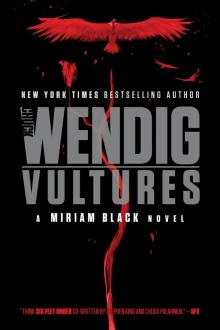 Vultures
Vultures Mockingbird
Mockingbird Wanderers
Wanderers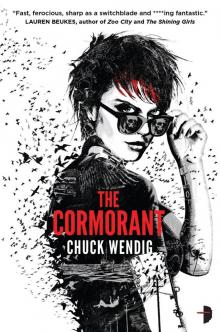 The Cormorant
The Cormorant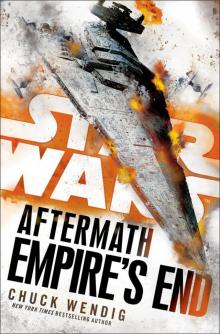 Empire's End: Aftermath (Star Wars)
Empire's End: Aftermath (Star Wars)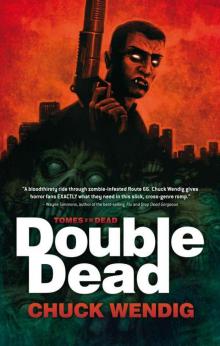 Double Dead
Double Dead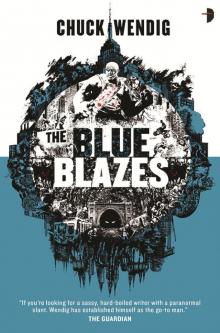 The Blue Blazes
The Blue Blazes 250 Things You Should Know About Writing
250 Things You Should Know About Writing Irregular Creatures
Irregular Creatures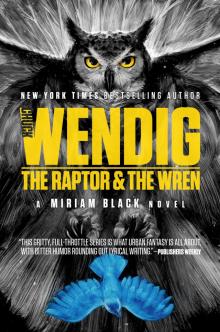 The Raptor & the Wren
The Raptor & the Wren Aftermath: Star Wars
Aftermath: Star Wars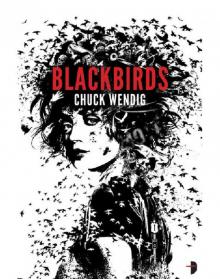 Blackbirds
Blackbirds The Hunt
The Hunt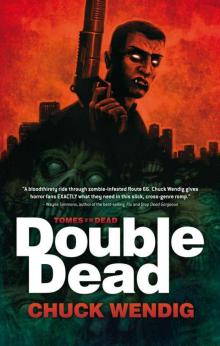 Tomes of the Dead (Book 1): Double Dead
Tomes of the Dead (Book 1): Double Dead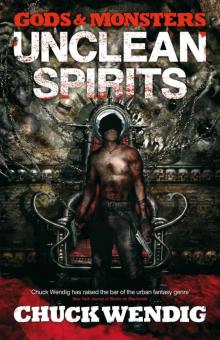 Gods and Monsters: Unclean Spirits
Gods and Monsters: Unclean Spirits The Harvest
The Harvest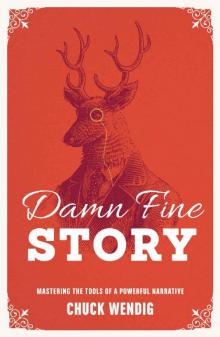 Damn Fine Story: Mastering the Tools of a Powerful Narrative
Damn Fine Story: Mastering the Tools of a Powerful Narrative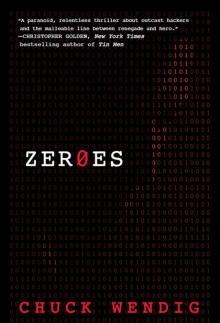 ZerOes
ZerOes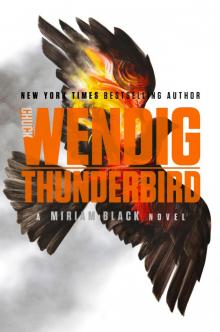 Thunderbird
Thunderbird The Hellsblood Bride
The Hellsblood Bride Double Dead: Bad Blood
Double Dead: Bad Blood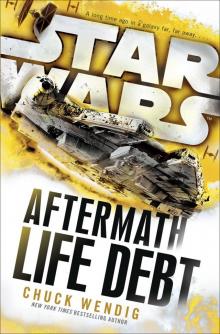 Life Debt
Life Debt